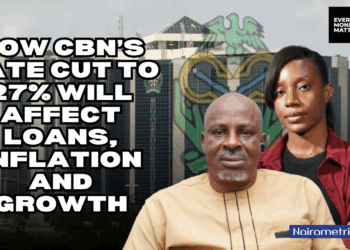The Bank of Ghana is set to conclude its series of interest rate hikes today, September 25th amid a decrease in inflation within its economy.
According to a Reuters Poll, 12 analysts were surveyed during the past week, with the majority (consisting of 10 analysts) anticipating that the Bank of Ghana will maintain its current interest rates during today’s meeting.
However, one analyst had proposed an additional hike of 150 basis points, while another suggested a rate reduction of 200 basis points.
In the past 2 years, the apex bank of the West African nation had hiked rates by 1,650 basis points as they battle with high inflation.
Falling Inflation
Ghana’s headline inflation rate declined to 40.1% in August, reaching a 10-month low to ease pressure on the central bank to keep raising borrowing costs.
The Government Statistician, Samuel Kobina Annim revealed that the annual inflation rate declined from 43.1% in July to 40.1% in the latest data from the West African nation.
Kobina Annim revealed that the main driver of the slowdown in inflation was a decline in food prices.
Food inflation slowed to 51.9% from 55% in July, and non-food price growth was 30.9% compared with 33.8%. Prices declined 0.2% month-on-month.
According to Reuters, Mike Kruiniger, a senior country risk analyst at BMI said:
- “Ghana’s disinflation process returned in August, with price growth moderating. This will allow the Bank of Ghana to conclude its monetary tightening cycle at the September meeting.”
Rising Cost of Living
Nairametrics reported that on Saturday, September 23rd, hundreds of aggrieved citizens convened in Accra, the capital of Ghana, for the third consecutive day of protests against the government, which have been triggered by economic hardships and have resulted in numerous arrests.
The protesters, some brandishing placards or the national flag, voiced their grievances about the soaring cost of living and the scarcity of job opportunities as they marched while being monitored by riot police.
The West African nation which is rich in gold, oil, and cocoa, is battling with its most severe economic crisis in decades, primarily due to escalating public debt.























